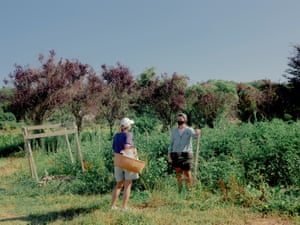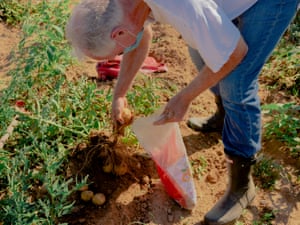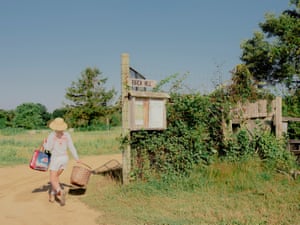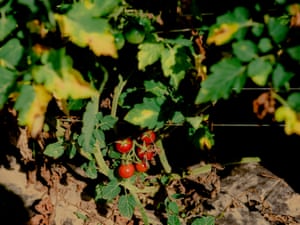Volunteers save New York's oldest community farm as Covid-19 hits agriculture
The pandemic upended the practices that typically keep Quail Hill Farm running smoothly. It’s emblematic of an industry-wide struggle

Layton Guenther helps a member in the potato field in Amagansett, New York.
Photograph: Steven Molina Contreras/The Guardian
On the same day the World Health Organization declared a pandemic, Quail Hill Farm’s new director faced a problem.
A group of AmeriCorps volunteers had just arrived on the Long Island farm, ready to get to work learning all the key facets of organic agriculture – but unlike most years, the farm could no longer safely house them. Layton Guenther was fresh on the job, and before they could devise a solution, the volunteers were ordered back home.
Now Guenther had to figure out how to run the farm without apprentices, and keep the regular crew safe during Covid-19. Meanwhile, interest in the farm’s community-supported agriculture (CSA) program was soaring, as residents now worried about routine trips to the grocery store.
With fewer farmhands than anticipated, the farm would be forced to innovate to meet the increased demand – and in the process, reimagine what a community farm looks like in the age of social distancing. The 35-acre farm, the oldest CSA in New York, would attempt what other, larger farms across the country were struggling with: just getting by.
“I just know I have to hold my breath,” said Guenther, comparing the task of running the farm through the compound challenges of a pandemic, a labor shortage, and fluctuating demand to being underwater, waiting for a wave to pass. “Eventually I will come up. And in the meantime I don’t know what is up and down.”
Quail Hill is proof of how farms big and small are struggling in the pandemic; large-scale operations that raise highly specialized products have recently been crippled by supply chain issues. While food banks faced increased demand, millions of hybrid, industrialized chickens and pigs were euthanized as meat processing facilities shut down. Millions of gallons of milk were thrown away, as it was nearly impossible for dairy farmers to pasteurize and package milk that was intended for school systems, despite an increase in demand from grocery stores.
And although Quail Hill is significantly smaller than those farms, its ability to pivot quickly during the pandemic is a sign that another world – where farms grow food that goes to those who need it – is possible.
Volunteers to the rescue
Immediately after the AmeriCorps volunteers left, Guenther put in place a hiring freeze – despite the fact that the farm faced a labor shortage that threatened the planting of crops such as sweet potatoes that arrived in flats and needed to be planted within two days. In an effort to stay self-contained, the farm’s existing crew essentially formed its own pod, said Guenther, meaning members limit their interactions with anyone outside the farm.
Since then, a huge network of volunteers has come out in support of the farm.
“The farm feels very held by the community right now,” said Guenther, who estimates by the end of the season, volunteers will have donated over 1,200 hours to keep Quail Hill running. “Many people have come out of the woodwork and said: ‘What can I do?’”
One volunteer, a television set builder, created and donated two new movable farmstands. This level of commitment goes above and beyond what is normally expected for a CSA, but for many members and nearby residents, keeping one of America’s oldest community farms running safely has become a priority.

Joe Petersen, a Quail Hill farm member, harvesting potatoes. Photograph: Steven Molina Contreras/The Guardian
A significant amount of additional labor is needed to pull off some tasks, such as preparing boxes with the farm’s weekly harvest for immunocompromised individuals and managing foot traffic. Even seemingly simple tasks like washing and bagging lettuce – in a way that doesn’t unnecessarily expose people to the virus – requires extra time and space.
The crew wears masks at all times on the farm, intermittently requesting permission to take the mask off and step more than 10ft away from others to eat an apple or drink water. Everyone plays a role: on Saturdays, Johnny, a seven-year-old volunteer, checks in members to their allotted time slots (a new tradition at Quail Hill – no more coming and going as you please) at a table with hand sanitizer, a sign requiring masks behind him.
These are challenges the agricultural industry across the US has faced during the pandemic; some aspects of farm work, like riding in trucks to grading potatoes, just require close contact. Farm workers often live together, in tight quarters.
But Quail Hill has made sacrifices to keep everyone safe. The farm’s tradition of allowing members to stop by with guests on harvest days is no more. Even in this, the workers have found an upside. “The work is more intimate,” said Dorian Payan. The 28-year-old production manager says forming a pod “makes things easier for the farm. It is more of an even pulse.”

Food insecurity is a longstanding problem in the region around Quail Hill Farm. Photograph: Steven Molina Contreras/The Guardian
Feeding the neighborhood
Quail Hill is located on the region of Long Island commonly referred to as the Hamptons, but Guenther is quick to point out that food insecurity has existed in the community since long before the pandemic; somewhere between 20% and 50% of children in the local public schools qualify for free lunches.
“Covid really laid those issues and those life experiences bare, especially for families that are dependent on the service industry,” they said.
Early in the pandemic, Guenther was contacted by members offering to subsidize CSA shares for local families in need. Using a local grant and donations, the farm partnered with the Bridgehampton childcare center to create fresh boxes of produce for the center’s new food pantry program.
To do so, Quail Hill gives its already-planted wholesale crops (which normally go to restaurants) to the food pantry, as the farm’s wholesale business shrank dramatically with Covid-19. This reallocation of resources is something many other farms – especially ones that grow highly specialized crops, such as potatoes for McDonald’s – have struggled to do.
Next season, Guenther hopes the farm will continue the partnership and plant more root vegetables like carrots, beets or potatoes, which are nutrient-dense and require less handling than, say, delicate greens.

The farm has offered a badly needed sense of community, members say. Photograph: Steven Molina Contreras/The Guardian
Scheduling concerns
Of all the new safety measures, the schedule has been the biggest consternation for members, who were used to stopping by the farm whenever they wanted on designated picking days. Many residents view Quail Hill as an extension of their backyards and bring guests to visit.
“In the beginning, there was this flurry of communication: ‘Which time slot did you choose?’” recalled Jane Weissman, 74, who has been a member of Quail Hill since 1990.
The new schedule allowed Weissman to make plans to see her friends. “You could choose the same time slot and socialize – otherwise it is the IGA supermarket parking lot,” she says, referring to the other neighborhood hotspot for running into friends.
The lengths to which the farm has gone to stay afloat during the pandemic, Guenther says, have made it clear how much members value Quail Hill as a community. When the season began, “it looked like people were coming out of their houses for the first time in months,” they said; one person cried while harvesting lettuce. “People are so grateful to have the experience of being outside.”
96 days to save the Earth ...
... because that is when the US withdraws from the Paris climate accord, on 4 November. Five years ago nearly 200 countries committed to a collective global response to tackle the climate crisis. But when Donald Trump took office he announced that the US would leave the Paris agreement. On the one issue that demands a worldwide response to help safeguard the Earth for future generations, the US has chosen to walk away. The president is playing politics with the climate crisis – the most defining issue of our time.
The stakes could scarcely be higher and with your help we can put this issue at the center of our 2020 election coverage. The election will be a referendum on the future of democracy, racial justice, the supreme court and so much more. But hovering over all of these is whether the US will play its role in helping take collective responsibility for the future of the planet.
The period since the Paris agreement was signed has seen the five hottest years on record. If carbon emissions continue substantial climate change is unavoidable. The most impacted communities will also be the most vulnerable. Instead of helping lead this discussion the White House prefers to roll back environmental protections to placate the fossil fuel industry.
High-quality journalism that is grounded in science will be critical for raising awareness of these dangers and driving change. You’ve read more than
in the last nine months. Because we believe every one of us deserves equal access to fact-based news and analysis, we’ve decided to keep Guardian journalism free for all readers, regardless of where they live or what they can afford to pay. This is made possible thanks to the support we receive from readers across America in all 50 states. If you can, support the Guardian from as little as $1 – and it only takes a minute. Thank you.

Recent Comments